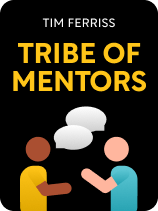

This article is an excerpt from the Shortform book guide to "Tribe of Mentors" by Tim Ferriss. Shortform has the world's best summaries and analyses of books you should be reading.
Like this article? Sign up for a free trial here.
Do you blindly adopt or reject advice? What’s the best way to make the most of counsel?
When Tim Ferriss wanted some advice, he sent the same list of 11 questions to scores of experts, promising to put his favorite responses into a book. The result is Tribe of Mentors. The book starts with a topic that might influence how you read the rest of it: how to take advice from others and even yourself.
Keep reading for some insights on how to interpret and apply advice.
How to Take Advice
We’ll begin by explaining why you shouldn’t completely trust any piece of advice, no matter who gives it to you. Then, we’ll detail an alternative to taking advice from others: trusting your intuition. Finally, we’ll explore a counterpoint some of Ferriss’s experts offer: Continually challenge your intuitive assumptions rather than trusting them implicitly.
Don’t Fully Trust Any Advice
Some of Ferriss’s experts argue against blindly accepting any advice because no single piece of advice applies to everyone. Writer and speaker Julia Galef asserts that the exact same advice may be helpful to one person and unproductive to another who’s in a different situation. Learn to critically judge the advice you receive, tailoring it to your unique circumstances or rejecting it if it doesn’t apply to your situation.
Similarly, philanthropist John Arnold recommends largely ignoring the advice of others. He says that nearly everyone who gives advice is drawing solely from anecdotal experience. Consequently, they make statements that seem objective but are actually unique to their circumstances. There’s no single path to greatness, no matter what anyone says. Two people using vastly different strategies can both find wild success. For instance, one author may write a bestseller by forcing themselves to sit and write down every idea they have. Another may write their bestseller by taking frequent walks and only writing down ideas when they flow naturally.
| Try the Opposite of Any Advice You Get Like Galef and Arnold, psychiatrist Scott Alexander says that no advice is universally useful. However, he presents a more radical solution than obeying or ignoring advice: doing the exact opposite of that advice. His logic is that people tend to gather in, or seek out, communities that affirm their preexisting beliefs. The advice you seek or receive is therefore likely to support your existing perspective and behavior, which is a problem if adopting an alternative perspective or pursuing a different course of action would be more beneficial. Additionally, as Arnold notes, people assume that their advice-givers’ subjective, anecdotal advice is universal wisdom, which leaves them unaware of their bias. Therefore, doing the opposite of the advice you hear could allow you to circumvent your group bias and improve your life by adding balance. For example, imagine someone who’s too frugal, pinching pennies at every opportunity and never spending outside of their budget. They’ll naturally read money-saving blogs and books on frugal living. They’d likely live a happier life if they worried about money less and spent generously on friends, but all the advice they seek out will be the opposite of what they need to hear. In contrast, an irresponsible spender will naturally seek advice from influencers selling lavish luxury items—but they’d likely live a better life if they took advice on saving for the future. Alexander notes that this idea doesn’t apply to all advice—some advice is good in every situation, like “always bring a parachute when you go skydiving. ” However, the thought experiment may encourage you to consider valuable ideas you otherwise wouldn’t have. This is one way you can apply critical thinking to the advice you receive, as Galef recommends. |
Trust Your Intuition
Rather than trusting the expertise of others, some of Ferriss’s experts suggest learning to take advice from yourself—trusting your intuition.
Hedge fund advisor and chess master Adam Robinson asserts that the intuitive unconscious mind is significantly more powerful and insightful than the conscious mind. Filmmaker and author Soman Chainani elaborates, arguing that many of your conscious thoughts that seem true are actually false ideas from your past that you haven’t challenged. In contrast, your unconscious mind communicates with intuitive feelings and images that are often more accurate indicators of the truth.
Trust Your Intuition When Creating Art
Many of Ferriss’s experts assert that trusting your intuition is particularly important when you’re creating art. Actor and director Ben Stiller argues that a unique, authentic voice is what makes art compelling. In particular, he warns against overriding your intuition by modeling your art after what you assume a broad audience wants to see. Television showrunner Brian Koppelman agrees, adding that the only way you can fully dedicate your heart and soul to your work is to create what you intuitively feel drawn to create. He notes that this level of dedication is necessary for the highest creative success.
Counterpoint: Question Your Assumptions
Although some of Ferriss’s experts advocate listening to your intuition, this advice may lead you astray if you implicitly trust that everything your gut tells you is true. Some of Ferriss’s other experts warn against this kind of unconditional confidence in your own beliefs, advising you to challenge every thought and feeling you have.
Martial artist and chess master Josh Waitzkin (The Art of Learning) advises regularly questioning everything you believe—and what those around you believe. If you don’t, you’ll default to instinctively trying to keep your worldview and beliefs static, which may cause you to suffer and prevent you from making forward progress in life.
Author and poker expert Annie Duke (Thinking in Bets) agrees, recommending that you actively search for people who disagree with you and hear them out. Set a goal to prove yourself wrong about something every day. She asserts that generally, the truth of any situation lies between two extreme opinions, and by considering both sides, you can gain a more accurate understanding of the world.

———End of Preview———
Like what you just read? Read the rest of the world's best book summary and analysis of Tim Ferriss's "Tribe of Mentors" at Shortform.
Here's what you'll find in our full Tribe of Mentors summary:
- Distilled life advice from over 130 world-class experts in various fields
- How to navigate non-traditional career paths, appreciate failure, and more
- Why you should allow a small amount of measured chaos in your schedule






